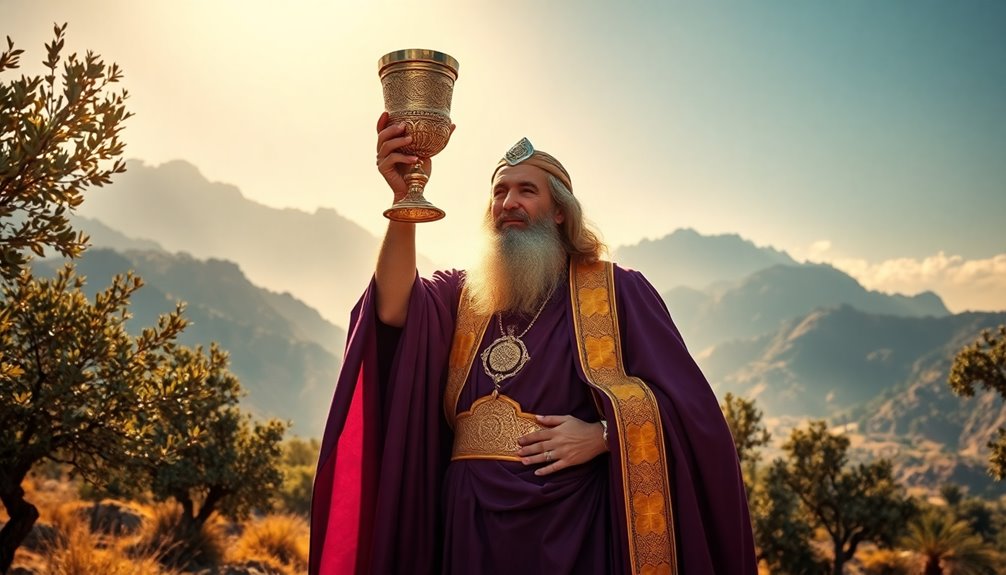Melchizedek is a significant figure in the Bible, appearing in Genesis 14 as both king and priest. His name means "king of righteousness," and he blesses Abraham and receives a tithe, reflecting his high spiritual status. Unlike the Levitical priests, Melchizedek has no recorded genealogy, adding to his mysterious nature. New Testament references, especially in Hebrews, present him as a type of Christ, emphasizing his eternal priesthood. Through his portrayal, you see the merging of spiritual authority and kingly power. If you're curious about the deeper implications of his role, there's much more to explore.
Key Takeaways
- Melchizedek, meaning "king of righteousness," is introduced in Genesis 14 as both king of Salem and priest of the Most High God.
- He blesses Abraham and receives a tithe, indicating his high spiritual authority and significance in biblical history.
- The Book of Hebrews emphasizes Melchizedek's unique priesthood, superior to the Levitical priesthood, and foreshadows Christ's eternal role.
- His lack of genealogy enhances his mysterious nature, symbolizing an eternal priesthood and connection to Jesus.
- Melchizedek's offering of bread and wine to Abraham foreshadows the Eucharist and represents divine nourishment and reconciliation.
Introduction

Introducing Melchizedek, a figure shrouded in mystery and significance, you'll find that he emerges in the biblical narrative as both a king and a priest. His name, meaning "king of righteousness," encapsulates his unique role.
In Genesis 14, he meets Abraham after the latter's victory over Chedorlaomer, blessing him and receiving a tithe. This act signifies Melchizedek's high spiritual authority and establishes a royal priesthood distinct from the Levitical order.
Melchizedek's importance doesn't end there; Psalm 110 refers to him as a priest forever, a declaration that hints at his eternal priesthood. This foreshadows the coming of Jesus Christ, who the Book of Hebrews identifies as a high priest in the order of Melchizedek. This connection highlights the superiority of Jesus' priesthood and its fulfillment of the roles that Melchizedek embodied.
His mysterious origins and absence of genealogy in scripture further enhance his enigmatic status, leading many to interpret Melchizedek as a type of Christ in Christian theology.
As you explore Melchizedek's character, you'll uncover profound implications for understanding both Old and New Testament themes.
Biblical References to Melchizedek
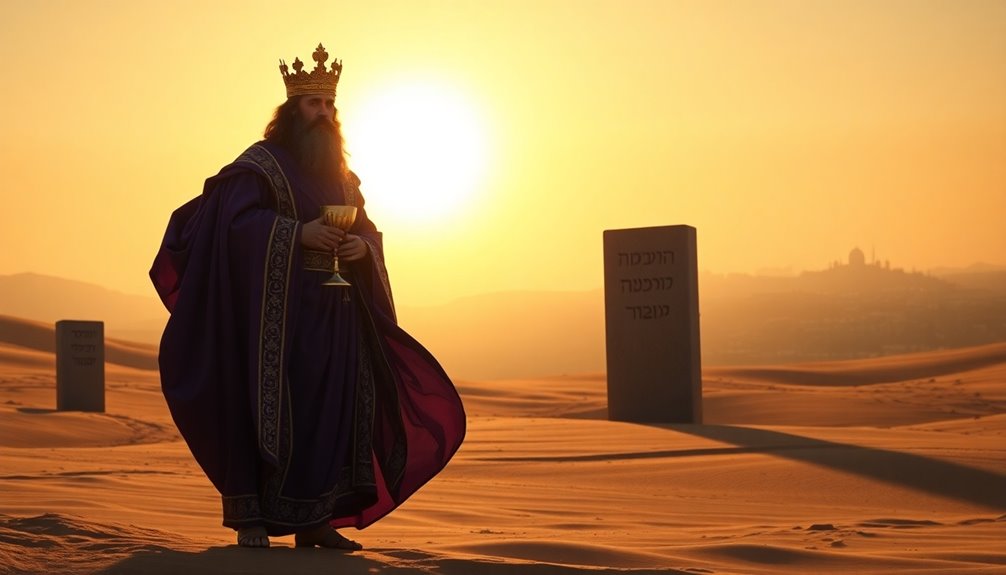
When you look at the Biblical references to Melchizedek, you'll find that his significance unfolds across several key passages.
Starting with Genesis 14:18-20, you see his role as both king and priest, and this theme carries through to Psalms and the Book of Hebrews.
Each reference builds upon the idea of Melchizedek's unique priesthood, setting the stage for deeper theological implications.
Primary Bible References
Melchizedek appears prominently in several key biblical passages that highlight his significance as both a king and a priest. You first encounter him in Genesis 14:18-20, where he's introduced as the King of Salem and a priest of the Most High God. After Abraham's victory over Chedorlaomer, Melchizedek blesses him, and Abraham gives him a tenth of everything, underscoring Melchizedek's high status.
In Psalm 110:4, Melchizedek is referred to as a priest forever in the order of Melchizedek, suggesting a link to a future messianic figure. This concept is further explored in the Book of Hebrews. In Hebrews 5:6 and 7:17, Melchizedek's unique priesthood is highlighted as superior to the Levitical priesthood.
You'll notice that he lacks a genealogical record, emphasizing his eternal nature.
Finally, Hebrews 7:24-25 draws parallels between Melchizedek and Jesus Christ, portraying Jesus as the ultimate high priest who fulfills and surpasses Melchizedek's role. Through these primary references, you see how Melchizedek serves as a foundational figure for understanding priesthood and messianic prophecy in the Bible.
Secondary Bible References
The enigmatic figure of Melchizedek is referenced beyond the primary biblical texts, enriching our understanding of his role in scripture. In Psalm 110:4, Melchizedek is heralded as a pivotal figure, where the psalmist declares that a future king will be a priest forever in the order of Melchizedek. This reference emphasizes Melchizedek's eternal priesthood, setting the stage for deeper theological implications.
The New Testament further develops this theme, particularly in the Book of Hebrews. Here, the author draws compelling parallels between Melchizedek and Jesus, emphasizing the superiority of Jesus' high priesthood.
Hebrews 7:1-17 highlights that Melchizedek is without genealogy, which contrasts sharply with the Levitical priesthood. This absence of lineage points to his unique status and eternal priesthood, reinforcing the significance of Melchizedek as a foreshadowing of Jesus' ministry.
Together, these secondary references create a rich tapestry that illustrates Melchizedek's foundational role in understanding Jesus as the ultimate high priest, bridging the Hebrew Bible and New Testament through the concept of a new covenant in Christian theology.
Ancient Near Eastern Priesthood
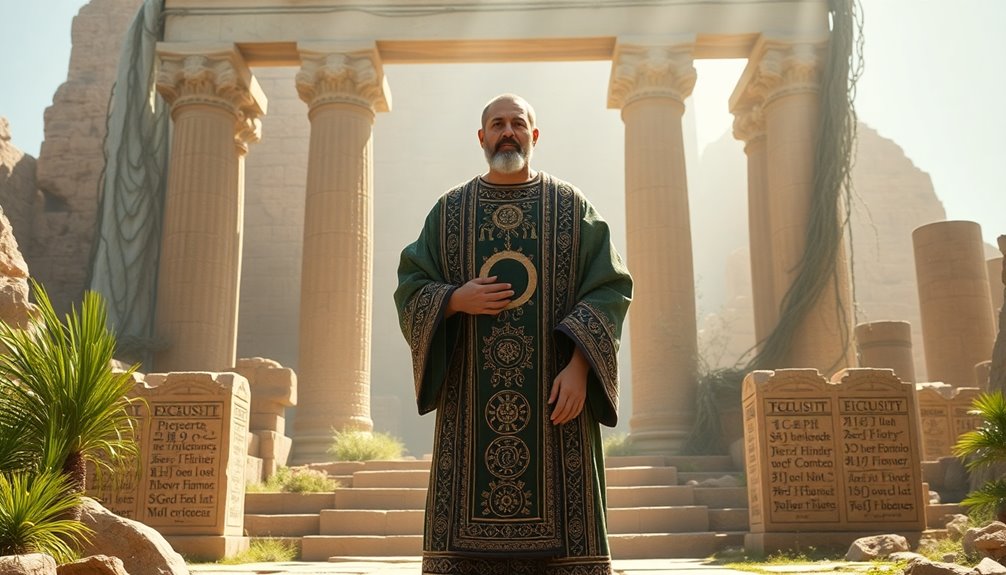
In the Ancient Near East, priesthood played a vital role in shaping societal structures, with rulers often stepping into dual roles as both political leaders and spiritual authorities. This blending of responsibilities reflects the belief that divine favor legitimized their rule.
Melchizedek stands out as a significant figure, identified as both king of Salem and priest of the Most High God. He exemplifies this intertwining of kingship and priesthood, which differs from the later Levitical priesthood established in Israel.
Priests in the Ancient Near East performed essential rituals, sacrifices, and offered blessings, drawing their authority from a perceived connection to the divine rather than a formal lineage. The practice of tithing, illustrated in Abraham's encounter with Melchizedek, highlights how offerings were made to honor deities and establish social or political ties.
Ancient Near Eastern texts often emphasize the importance of priestly figures like Melchizedek, who acted as intermediaries between the divine and human realms. Their blessings and rituals were crucial in maintaining societal order, showcasing the significant role of priesthood in the cultural and religious fabric of the Ancient Near East.
Symbolism of Melchizedek's Priesthood

Symbolism in Melchizedek's priesthood intertwines authority and spiritual leadership, highlighting a unique role within the biblical narrative. Melchizedek embodies the dual roles of king and priest, which underscores the importance of both governance and spiritual guidance.
As the King of Peace, he represents not just a ruler but a mediator of divine peace and reconciliation. His offering of bread and wine to Abraham foreshadows the Eucharist, illustrating themes of divine provision and communion with God.
This act reflects the nourishment of the soul, linking earthly sustenance with spiritual sustenance. Moreover, Melchizedek's eternal priesthood, as described in Hebrews, signifies a priesthood that transcends the Levitical order, emphasizing the superiority of Christ's intercession.
Misunderstanding Melchizedek's Identity
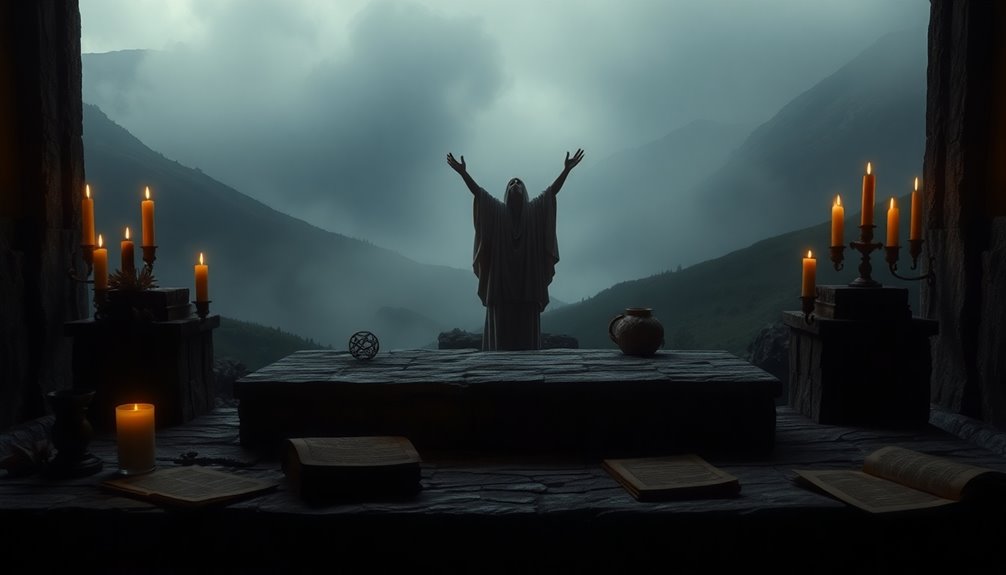
You might think of Melchizedek as just a Canaanite king, but there's much more to his identity.
His unique role as both a king and priest, along with the lack of genealogy, raises questions that often lead to misunderstandings.
It's crucial to consider the historical context and how interpretations have shaped our view of him throughout biblical texts.
Debunk Misconceptions About Melchizedek
Debunking misconceptions about Melchizedek reveals the complexities of his identity in biblical texts. Many assume he belongs to the Levitical priesthood, but that's not the case. Melchizedek is a Canaanite priest of God Most High, making him the first royal priest mentioned in the Bible. His name means "king of righteousness," and he also serves as the king of Salem, which later becomes Jerusalem, showcasing his dual role.
One common misconception is his lack of genealogy. Unlike Levitical priests, Melchizedek has no recorded lineage, which adds to the mystery of his identity. This absence emphasizes the concept of an eternal priesthood, distinguishing him from those bound by family lineage.
The book of Hebrews highlights this distinction, presenting Melchizedek as a type of Christ. It argues that Jesus' priesthood surpasses the Levitical order, echoing Melchizedek's eternal priesthood (Hebrews 7:1–3).
Some interpretations suggest Melchizedek's description as "without father or mother" serves a theological purpose rather than indicating a literal absence of genealogy, symbolizing his divine authority. Understanding these aspects helps clarify the unique significance of Melchizedek in scripture.
Historical Context Misinterpretations
The historical context of Melchizedek's identity is often misinterpreted, leading to confusion about his role in the biblical narrative. Many view him merely as a Canaanite chief or deity, overlooking his significance as a legitimate priest of the Most High God (El Elyon) who blesses Abraham in Genesis 14. The suffix "-zedek" is sometimes misassociated with a Canaanite deity, complicating the understanding of his true nature as a priest of Yahweh.
Additionally, the blending of royal and priestly functions in Melchizedek is frequently misunderstood. This conflation can lead you to underestimate his importance compared to the Levitical priesthood.
The silence surrounding Melchizedek's genealogy in Genesis invites varied interpretations, with some scholars suggesting this ambiguity emphasizes his unique priesthood.
These misinterpretations can overshadow Melchizedek's role as a foreshadowing of Christ's eternal priesthood, as highlighted in the New Testament's references in Hebrews and Psalm 110.
Recognizing Melchizedek as a distinct figure who transcends traditional roles helps clarify his pivotal position in biblical theology and enriches your understanding of the overall narrative.
Spiritual Leadership in Communities
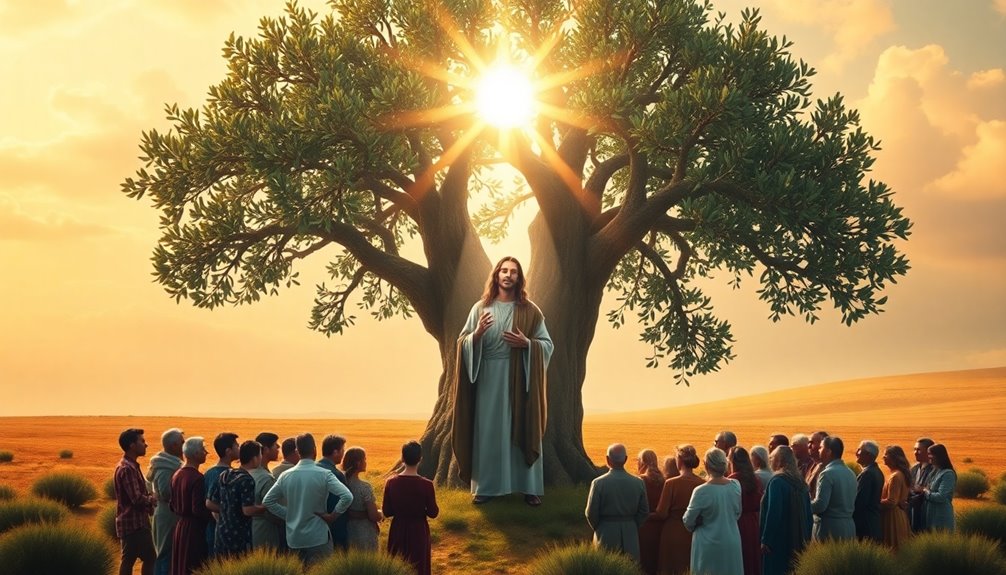
When you think about spiritual leadership, consider how mentoring others in faith can transform communities.
By fostering intergenerational relationships, you create a bridge that connects wisdom with fresh perspectives.
This dynamic not only strengthens individual faith but also enriches the community as a whole, reflecting the essence of Melchizedek's legacy.
Mentoring Others in Faith
Mentoring others in faith creates a powerful network of spiritual growth and support within communities. Just as Melchizedek blessed Abraham, you can establish a foundation of spiritual leadership by guiding younger believers in their journeys.
Effective mentoring involves regular, meaningful conversations that foster deep connections, echoing the communal aspect of faith seen in the early church.
Resources like Melissa Kruger's "Growing Together" offer structured approaches to mentoring, equipping both you and your mentees with essential tools for spiritual development and accountability.
By embodying the priest-king role of Melchizedek, you can provide both spiritual authority and relational warmth, creating an environment where mentees feel supported and encouraged in their faith.
Emphasizing the importance of discipleship, you can help others navigate the complexities of their spiritual journeys. Additionally, being aware of potential narcissistic behaviors can protect both you and your mentees from unhealthy dynamics in relationships.
Your experiences and insights can illuminate the path for those seeking to grow in their faith, much like the enduring legacy of Melchizedek in the biblical narrative.
Through your mentoring, you're not just imparting knowledge; you're nurturing a community that thrives on mutual support and spiritual growth.
Fostering Intergenerational Relationships
Building on the power of mentoring, fostering intergenerational relationships in spiritual communities can significantly enhance growth and understanding among believers.
Just as Melchizedek bestowed a blessing on Abraham, these connections allow younger members to gain wisdom and spiritual authority from their elders. When you engage in intergenerational dialogue, it fosters a sense of belonging and continuity, crucial for effective discipleship.
Creating programs that connect various age groups addresses the spiritual needs of all generations, cultivating a supportive environment for growth.
Encouraging older members to take on mentorship roles enriches the spiritual formation of younger believers. This mirrors the relationship between Melchizedek and Abraham, where mentorship bridged the gap between God and humanity.
Eternal Significance of Melchizedek
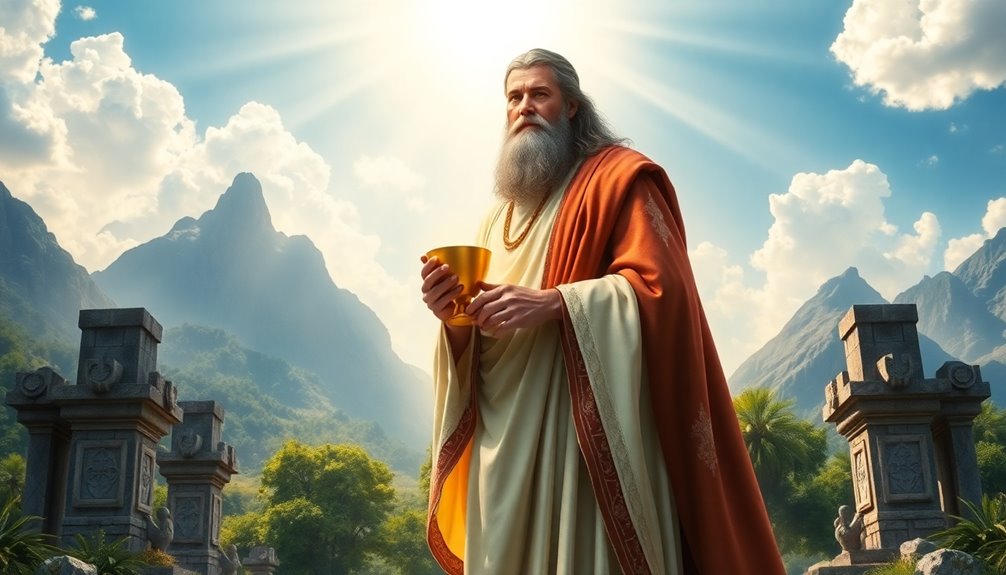
The eternal significance of Melchizedek lies in his unique role as a mediator between God and humanity, transcending the limitations of the Levitical priesthood. As the "King of Righteousness," Melchizedek represents a priestly order that predated and surpassed Aaron's lineage, establishing a vital connection to the messianic role of Jesus Christ.
In Psalm 110, he's referred to as a priest forever, emphasizing his lasting impact on the understanding of priesthood. The Book of Hebrews elevates Melchizedek's priesthood, framing Jesus as the ultimate high priest in this order. This perspective enhances your comprehension of Christ's eternal role and His divine authority.
Melchizedek's encounter with Abraham showcases the principles of blessing and tithing, reinforcing the importance of worship and reverence in your relationship with God.
Moreover, the mystery surrounding Melchizedek—his lack of genealogical lineage—adds depth to his significance as an archetype of Christ. This timelessness encapsulates a priesthood that transcends generations, pointing toward a divine plan that unfolds through history.
Additional Resources

Understanding Melchizedek's eternal significance opens the door to a wealth of resources that can deepen your knowledge and appreciation of this enigmatic figure. To start, dive into Genesis 14:18-20, where Melchizedek first appears as both King and Priest, blessing Abraham and introducing the concept of tithing. This dual role is foundational to understanding his impact on biblical theology.
Next, explore Psalm 110:4, which proclaims Melchizedek's priesthood permanently, establishing a connection to the anticipated messianic figure. The New Testament extensively references this psalm, particularly in the Book of Hebrews. Hebrews 7 elaborates on Melchizedek's unique priesthood, asserting its superiority over the Levitical priesthood and linking it to Jesus Christ as the high priest in the order of Melchizedek.
Additionally, various commentaries and academic texts analyze Melchizedek's role in both Jewish and Christian traditions. Liturgical references in the Roman Canon and the Book of Mormon further highlight his enduring theological significance.
These resources will deepen your understanding of Melchizedek as a figure representing the eternal priesthood of God Most High and its implications for faith today.
Frequently Asked Questions
What Is the Significance of Melchizedek in the Bible?
You'll find significance in Melchizedek as a symbol of spiritual authority and righteousness.
His dual role as a king and priest showcases the blend of political and spiritual leadership, which can inspire your understanding of authority in your own life.
Who Gave Birth to Melchizedek?
You might wonder about Melchizedek's origins and who gave birth to him.
Unfortunately, there's no definitive answer. His background remains a mystery, as historical texts don't provide details about his parents.
This lack of information contributes to his enigmatic status, allowing various interpretations about his significance.
You can explore different traditions and theories, but ultimately, the absence of genealogical details keeps Melchizedek shrouded in intrigue.
What Is the Connection Between Melchizedek and Jesus?
You'll find a profound connection between Melchizedek and Jesus in their dual roles as both king and priest.
This unique combination emphasizes their authority and mediatory functions. Jesus, like Melchizedek, represents an eternal priesthood that transcends traditional boundaries.
When you explore their significance, you see how Melchizedek foreshadows Jesus' ultimate sacrifice and spiritual sustenance for humanity, illustrating a divine plan for redemption and the establishment of a new covenant.
What Happened to Melchizedek in the Bible?
You might wonder what happened to Melchizedek after he appeared in the biblical narrative.
While the text doesn't provide much detail about his life following his encounter with Abram, his legacy endures.
He's celebrated for his unique role as both king and priest, symbolizing a divine authority that transcends time.
His mention in later scripture suggests that he represents an eternal priesthood, leaving a lasting impact on theological discussions throughout history.

